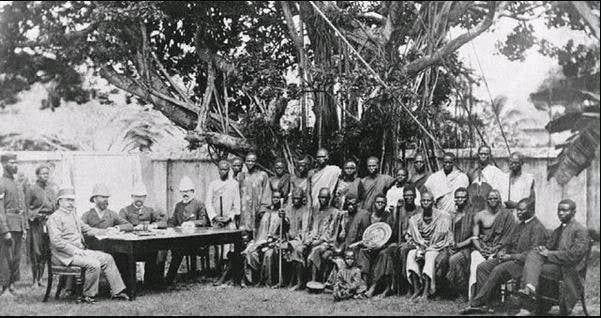Royal Niger Company
The Royal Niger Company was a mercantile company chartered by the British government in the 19th century. It was:
- Formed in 1879 as the United African Company
- Renamed National African Company in 1881
- Renamed again to Royal Niger Company in 1886
In 1929, it became part of the United Africa Company, which came under Unilever's control during the 1930s and remained a subsidiary until it was absorbed into Unilever in 1987.
Although the company existed only from 1879–1900, it was instrumental in the formation of Colonial Nigeria, helping the British Empire gain control over the lower Niger during the 1890s.
By 1900, the company-controlled areas became the Southern Nigeria Protectorate, which was later united with the Northern Nigeria Protectorate to form the Colony and Protectorate of Nigeria in 1914.
Nigeria gained independence within these borders in 1960.
United African Company (1879)
- Richard Lander explored the Niger area in 1830 with his brother and later returned in 1832 to establish a trading post.
- The African Steamship Company failed its 1832 expedition due to disease and conflict.
- Macgregor Laird, a survivor, continued to fund expeditions until his death in 1861.
- In 1877, George Goldie advocated for merging British firms into a monopoly to counter French and German rivals.
- By 1879, he had combined several British firms into the United African Company (UAC).
However, competition resurfaced as French and British companies established new posts. The British government rejected Goldie's request for a charter in 1881 due to concerns over international conflict and undercapitalization.
National African Company (1882)
- Goldie responded by creating the National African Company (NAC), capitalized at £1,000,000.
- The NAC bought out the UAC and defeated competitors in a two-year price war.
- By 1884, the NAC had 30 trading posts and full commercial control of the Niger–Binué region.
- This monopoly enabled Britain to secure the region during the 1884–1885 Berlin Conference as a British sphere of influence.
Despite promises of free trade, NAC’s 400+ treaties with local rulers restricted them to trade solely with the company. British officials backed these treaties, and independent traders like King Jaja of Opobo were neutralized — in Jaja's case, by exile.
Royal Niger Company (1886)
With British objections lifted, the NAC received a Royal Charter in July 1886, becoming the Royal Niger Company Chartered and Limited.
- Lord Aberdare was appointed governor
- George Goldie served as vice-governor
The company operated like a private colonial authority, collecting customs duties and maintaining order through military means.
Niger Company (Post-1899)
The Royal Niger Company could not compete with state-supported French and German protectorates. Its charter was revoked in 1899, and on January 1, 1900, it sold its territories to the British Government for £865,000.
The territories were reorganized into:
- Northern Nigeria Protectorate
- Southern Nigeria Protectorate
These were later unified into modern-day Nigeria in 1914.
The company was renamed The Niger Company Ltd, and in 1929, it became part of the United Africa Company.
United Africa Company & Unilever
- 1930s: The United Africa Company came under Unilever
- 1987: Fully absorbed into Unilever
See Also
- Alhassan Dantata
- Royal Niger Company’s Medal
- Postage Stamps and Postal History of the Niger Territories
- Sokoto
References
- "Nigeria". Encyclopædia Britannica. Vol. 19 (11th ed.). 1911. pp. 677–684.
- "Lugard, Sir Frederick John Dealtry". Encyclopædia Britannica. Vol. 17 (11th ed.). 1911. pp. 115–116.
